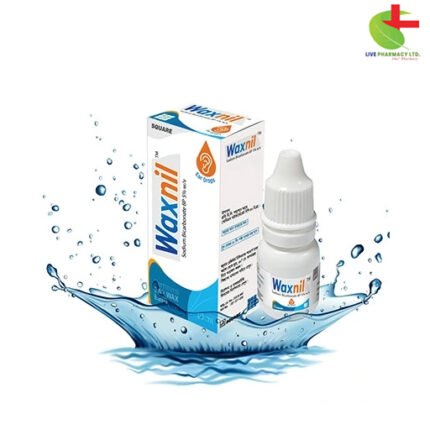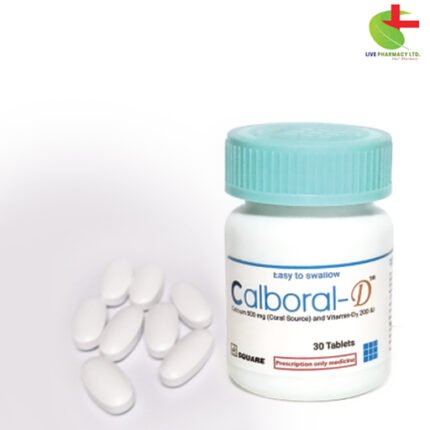Colimax 0.6
60.00৳ Strip
- Colimax: FDA-approved medication for acute gout flares and Familial Mediterranean Fever (FMF) in adults and children aged 4+
- Inhibits white blood cell migration to inflamed areas, reducing pain and inflammation associated with gout attacks
- Well-understood pharmacology ensures timely relief while minimizing side effects
- Trust Colimax for prompt and targeted relief from gout discomfort
 Brand
Brand
|
Square Pharmaceuticals PLC |
|---|---|
 Generics
Generics
|
Colchicine |
Indications
Colimax serves as an effective remedy for addressing acute gout flares and is also beneficial for managing Familial Mediterranean Fever (FMF) in adults and children aged 4 and above.
Description
Approved by the FDA, Colimax plays a pivotal role in both preventing and treating sudden and severe gout attacks. During gout, uric acid crystals accumulate in specific joints, triggering an inflammatory response. White blood cells migrate to these affected areas, aiming to engulf the crystals, resulting in the release of lactic acid and pro-inflammatory enzymes. This process leads to the hallmark pain and swelling of gout. Colimax intervenes by inhibiting the migration of white blood cells to the inflamed area, thereby reducing pain and inflammation.
Pharmacology
Gout attacks stem from an inflammatory reaction to deposits of monosodium urate crystals in joint tissues, aggravated by further accumulation of these crystals. Leukocytes migrate to these sites, attempting to phagocytose the crystals, consequently releasing lactic acid and pro-inflammatory enzymes, which induce inflammation characterized by severe pain, redness, and swelling in the affected joint. Colchicine, a key component of Colimax, inhibits uric acid phagocytosis by leukocytes and directly diminishes lactic acid production, thus disrupting the cycle of urate crystal deposition and the ensuing inflammatory response that perpetuates gout attacks.
Colchicine is orally absorbed, with peak concentration (Cmax) typically reaching 2.5 ng/mL within 1 to 2 hours under fasting conditions. Its distribution volume is around 5 to 8 L/kg, with low binding to serum proteins. Metabolism primarily involves CYP3A4, resulting in minimal plasma levels of metabolites. Following multiple oral doses, the elimination half-life ranges from 26.6 to 31.2 hours.
Dosage & Administration
For acute gouty arthritis, the initial dose of Colimax ranges from 1 to 1.2 mg, administered every 2 hours until pain and inflammation subside. Typically, 4 to 8 mg of Colimax is sufficient to manage pain and inflammation during an attack. Relief from articular pain and swelling is usually experienced within 12 hours and resolves within 24 to 48 hours. It is recommended to wait for three days between Colimax courses to minimize the risk of cumulative toxicity.
For prophylaxis during intercritical periods, Colimax may be continuously administered to reduce the frequency and severity of attacks. The dosage varies depending on the frequency of attacks, with adjustments made accordingly.
In patients undergoing surgery, Colimax prophylaxis may be warranted to prevent gout attacks triggered by surgical procedures.
Interaction
Co-administration of P-gp and/or CYP3A4 inhibitors, such as clarithromycin or cyclosporine, can impact Colimax concentration.
Contraindications
Colchicine should not be given to patients with renal or hepatic impairment in conjunction with P-gp or strong CYP3A4 inhibitors like clarithromycin or cyclosporine.
Side Effects
Potential side effects of Colimax include blood dyscrasias such as myelosuppression, leukopenia, granulocytopenia, thrombocytopenia, and aplastic anemia. Gastrointestinal symptoms like diarrhea and pharyngolaryngeal pain may also occur.
Pregnancy & Lactation
Colchicine falls under Pregnancy Category C, with limited studies conducted in pregnant women. Caution is advised when administering Colchicine to nursing mothers due to its excretion into human milk.
Use in Special Populations
The safety and efficacy of Colimax in pediatric patients have not been established, as gout is rare in this population.
Overdose Effects
The precise dose of Colimax leading to significant toxicity remains unknown. Fatalities have occurred with doses as low as 7 mg over a 4-day period, while others have survived doses exceeding 60 mg. Patients who overdose may experience varying degrees of toxicity, with symptoms ranging from gastrointestinal issues to myelosuppression.
Therapeutic Class
Colimax belongs to the class of drugs used in gout management.
Storage Conditions
Store Colimax below 30°C, protecting it from light and moisture. Keep it out of reach of children.













Reviews
There are no reviews yet.